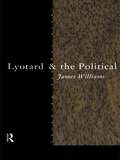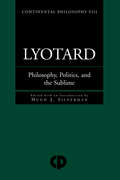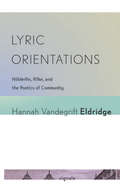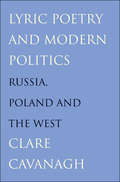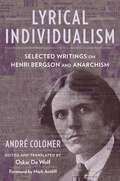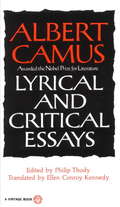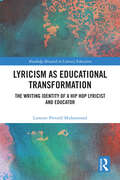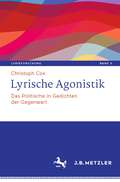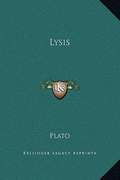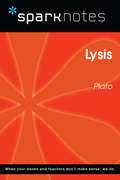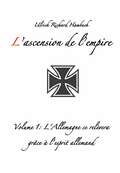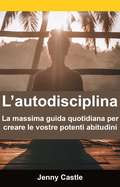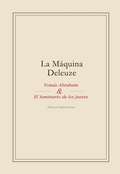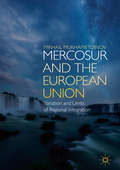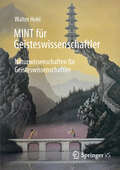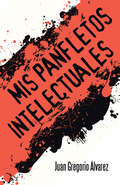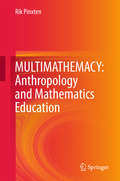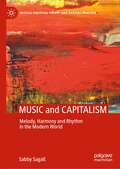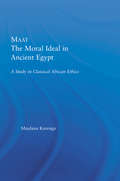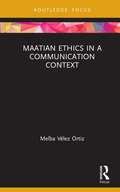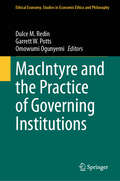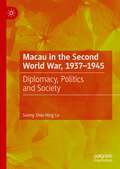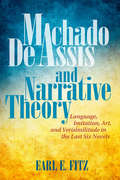- Table View
- List View
Lyotard and the Political (Thinking the Political)
by James WilliamsLyotard and the Political is the first book to consider the full range of the political thought of the French philosopher François Lyotard and its broader implications for an understanding of the political. James Williams clearly and carefully traces the development of Lyotard's thought from his early Marxist essays on the Algerian struggle for independence to his break with the thought of Marx and Freud. This is compared with Lyotard's later, highly influental writings on the politics of desire and his attempts to base a postmodern political discourse on the sublime. An indispensable work for all who are interested in modern continental philosophy, Lyotard and the Political offers the first systematic analysis of the political dimension of the work of one of the most controversial and influential philosophers of the twentieth century. Also available in this series: Lacan and the Political Pb: 0-415-17187-3: £12.99 Heidegger and the Political Pb:0-415-13064-6: £12.99 Derrida and the Political Pb: 0-415-10967-1: £13.99 Nietzche and the Political Pb: 0-41510069-0: £12.99 Foucault and the Political Pb: 0-415-10066-6: £12.99
Lyotard: Philosophy, Politics and the Sublime (Continental Philosophy #Vol. 8)
by Hugh J. SilvermanFirst published in 2003. Routledge is an imprint of Taylor & Francis, an informa company.
Lyric Orientations: Hölderlin, Rilke, and the Poetics of Community
by Hannah Vandegrifte EldridgeIn Lyric Orientations, Hannah Vandegrift Eldridge explores the power of lyric poetry to stir the social and emotional lives of human beings in the face of the ineffable nature of our mortality. She focuses on two German-speaking masters of lyric prose and poetry: Friedrich Hölderlin (1770-1843) and Rainer Maria Rilke (1875-1926). While Hölderlin and Rilke are stylistically very different, each believes in the power of poetic language to orient us as social beings in contexts that otherwise can be alienating. They likewise share the conviction that such alienation cannot be overcome once and for all in any universal event. Both argue that to deny the uncertainty created by the absence of any such event (or to deny the alienation itself) is likewise to deny the particularly human condition of uncertainty and mortality. By drawing on the work of Stanley Cavell, who explores how language in all its formal aspects actually enables us to engage meaningfully with the world, Eldridge challenges poststructuralist scholarship, which stresses the limitations--even the failure--of language in the face of reality. Eldridge provides detailed readings of Hölderlin and Rilke and positions them in a broader narrative of modernity that helps make sense of their difficult and occasionally contradictory self-characterizations. Her account of the orienting and engaging capabilities of language reconciles the extraordinarily ambitious claims that Hölderlin and Rilke make for poetry--that it can create political communities, that it can change how humans relate to death, and that it can unite the sensual and intellectual components of human subjectivity--and the often difficult, fragmented, or hermetic nature of their individual poems.
Lyric Poetry and Modern Politics
by Clare CavanaghLyric Poetry and Modern Politics explores the intersection of poetry, national life, and national identity in Poland and Russia, from 1917 to the present. As a corrective to recent trends in criticism, acclaimed translator and critic Clare Cavanagh demonstrates how the practice of the personal lyric in totalitarian states such as Russia and Poland did not represent an escapist tendency; rather it reverberated as a bold political statement and at times a dangerous act. Cavanagh also provides a comparative study of modern poetry from the perspective of the eastern and western sides of the Iron Curtain. Among the poets discussed are Blok, Mayakovsky, Akhmatova, Yeats, Whitman, Frost, Szymborska, Zagajewski, and Milosz; close readings of individual poems are included, some translated for the first time. Cavanagh examines these poets and their work as a challenge to Western postmodernist theories, thus offering new perspectives on twentieth-century lyric poetry.
Lyrical Individualism: Selected Writings on Henri Bergson and Anarchism (Columbia Themes in Philosophy, Social Criticism, and the Arts)
by Andre ColomerIn the early twentieth century, André Colomer was perhaps the best-known figure in the anarchist movement. A poet, philosopher, activist, and public speaker, he was enmeshed in the Parisian political and artistic scene at a time of political and cultural revolution. Amid the avant-garde explosions of Cubism, futurism, and surrealism and the ferment of radical politics on left and right, Colomer became anarchism’s leading advocate. He galvanized the Parisian public through his agitational writing and organizing, as well as his involvement in a sensational murder case, while developing a distinctive philosophical account of anarchist individualism. Yet Colomer died in obscurity in Moscow, abandoned by his friends and comrades, and is scarcely known in the English-speaking world today.Lyrical Individualism presents a selection of Colomer’s crucial writings, with a focus on anarchist theory and the philosophy of Henri Bergson. It reveals the richness of Colomer’s philosophical work, particularly his creative engagement with Bergson, Max Stirner, and Friedrich Nietzsche to forge a novel anarchist ideology. Colomer’s writings not only offer valuable insights into interwar anarchism, they also present a distinctive philosophical vision that in many ways anticipates theories and debates animating radical political movements today. This book also showcases his acerbic and pugnacious political commentary on the turbulent events of the 1910s and 1920s. The first translation and publication of Colomer’s work since his untimely death in 1931, Lyrical Individualism allows a range of readers to discover this vital thinker.
Lyrical and Critical Essays
by Albert Camus'The literary output of Albert Camus was exceptionally concentrated and well organized, so that each part of it throws light on other parts. . . . Here now, for the first time in a complete English translation, we have Camus' three little volumes of essays, plus a selection of his critical comments on literature and on his own place in it. As might be expected, the main interest of these writings is that they illuminate new facets of his usual subject matter. '-John Weightman, The New York Times Book Review.
Lyricism as Educational Transformation: The Writing Identity of a Hip Hop Lyricist and Educator (Routledge Research in Literacy Education)
by Lamont Pretrell MuhammadThis volume explores the pedagogical and transformative potential of writing lyrics. Based on an autoethnographic study and inspired by Ivanič’s notion of writer identity, it explores how writing can nurture different aspects of students’ identity, allowing them to connect with and engage in their social and community background. Through an analysis of the author’s lived experiences as a Black male educator and author, Hip Hop lyricist, and curriculum writer, it details how the lyrics of Hip Hop artists served as educational experiences in his journey toward becoming a Hip Hop artist and educator, as well as how he developed his experiences into a template for his students to follow through programs such as Hip Hop Literacy.A unique and engaging exploration of lyricism, this book examines themes such as building positive classroom relationships, self-actualization, self-expression, skill acquisition, and culturally responsible pedagogy. It will be of interest to researchers and educators involved in alternative literacy practices, Hip Hop education, autoethnography, and curriculum studies.
Lyrische Agonistik: Das Politische in Gedichten der Gegenwart (Lyrikforschung. Neue Arbeiten zur Theorie und Geschichte der Lyrik #3)
by Christoph CoxAusgehend von der These, dass es sich bei der politischen Lyrik der Gegenwart vor allem um eine Lyrik des Politischen, eine lyrische Streitkultur handelt, wird in „Lyrische Agonistik. Das Politische in Gedichten der Gegenwart“ auf der Basis einer philosophischen ‚neue‘ Rhetorik und mit Rückbezug auf Ansätze der radikalen Demokratietheorie insbesondere von Chantal Mouffe und Ernesto Laclau eine neuartige rhetorische Methode zur Analyse des Politischen in der Lyrik der Gegenwart entwickelt. Grundlegend für diese Methode ist die von sophistischer Rhetoriktradition und radikaler Demokratietheorie geteilte Skepsis gegenüber allen epistemischen Letztbegründungsversuchen. Das Politische in der Lyrik der Gegenwart erweist sich im Kontext dieser beiden Bezugspunkte als die Zurückweisung fundamentaler Gründungversuche, die sich als diskursive Form der Verhandlung einer nur plausiblen, in ihrer Kontingenz stets angreifbaren Politik äußert. Ablesbar wird diese postfundamentalistische Wende in gegenwärtigen Gedichten anhand von rhetorischen Widersprüchen, die auf den unaufhebbaren konflikthaften Charakter des Politischen hindeuten, deren notwendige Gegenseite der ebenso rhetorisch ausgearbeitete Versuch ist, umstrittene Diskurse zugunsten einer nie letztbegründbaren Position zu hegemonisieren. Aufgezeigt wird das dem Politischen eigene Spiel aus Kontingenzerfahrung und Schließungsbemühungen anhand von drei disparaten Textbeispielen politischer Lyrik der letzten zehn Jahre: Tom Schulz’ „Die Maschinen sind volljährig“, Günter Grass’ „Was gesagt werden muss“ und Monika Rincks „was machen die frauen am sonntag?“.
Lysis
by PlatoNo answer is given in the Lysis to the question, ‘What is Friendship?’ any more than in the Charmides to the question, ‘What is Temperance?’ There are several resemblances in the two Dialogues: the same youthfulness and sense of beauty pervades both of them; they are alike rich in the description of Greek life. The question is again raised of the relation of knowledge to virtue and good, which also recurs in the Laches; and Socrates appears again as the elder friend of the two boys, Lysis and Menexenus. In the Charmides, as also in the Laches, he is described as middle-aged; in the Lysis he is advanced in years. The Dialogue consists of two scenes or conversations which seem to have no relation to each other. The first is a conversation between Socrates and Lysis, who, like Charmides, is an Athenian youth of noble descent and of great beauty, goodness, and intelligence: this is carried on in the absence of Menexenus, who is called away to take part in a sacrifice. Socrates asks Lysis whether his father and mother do not love him very much? ‘To be sure they do.’ ‘Then of course they allow him to do exactly as he likes.’ ‘Of course not: the very slaves have more liberty than he has.’ ‘But how is this?’ ‘The reason is that he is not old enough.’ ‘No; the real reason is that he is not wise enough: for are there not some things which he is allowed to do, although he is not allowed to do others?’ ‘Yes, because he knows them, and does not know the others.’ This leads to the conclusion that all men everywhere will trust him in what he knows, but not in what he does not know; for in such matters he will be unprofitable to them, and do them no good. And no one will love him, if he does them no good; and he can only do them good by knowledge; and as he is still without knowledge, he can have as yet no conceit of knowledge. In this manner Socrates reads a lesson to Hippothales, the foolish lover of Lysis, respecting the style of conversation which he should address to his beloved. After the return of Menexenus, Socrates, at the request of Lysis, asks him a new question: ‘What is friendship? You, Menexenus, who have a friend already, can tell me, who am always longing to find one, what is the secret of this great blessing.’
Lysis (SparkNotes Philosophy Guide)
by SparkNotesLysis (SparkNotes Philosophy Guide) Making the reading experience fun! SparkNotes Philosophy Guides are one-stop guides to the great works of philosophy–masterpieces that stand at the foundations of Western thought. Inside each Philosophy Guide you&’ll find insightful overviews of great philosophical works of the Western world.
L’ascension de l’empire
by Ulrich Richard HambuchLe peuple des poètes et des penseurs, qui a été deux fois victime de terribles guerres mondiales dans l’histoire récente, est à nouveau en crise profonde ces jours-ci et se trouve à un carrefour. Au cours des sept dernières années, d’innombrables œuvres brillantes sur le plan analytique, mais sobres, longues et pour la majorité incompréhensibles et donc finalement éphémères ont été produites dans ce contexte, dans lesquelles les auteurs se sont sentis appelés à dévoiler et dénoncer les choses qui nous ont consciemment ou inconsciemment opprimés au cours des dernières décennies. En fin de compte, cependant, tous les auteurs que je connaissais ont échoué à esquisser une alternative holistique et durable à l’état actuel. Il fallait y remédier. Aujourd’hui, je considère cela comme une coïncidence du destin, qui depuis quelques années ne m’a pas permis de poursuivre mon activité habituelle de manière permanente et complète et le destin m’a conduit à partir de maintenant à me consacrer en retraite et en impartialité au sujet de la recherche de la vérité. En tant que personne capable d’agir après un moment d’apprentissage, de réflexion, de ressenti et de pause, je n’ai pu trouver ma place dans aucun parti, entreprise ou lieu en République fédérale d’Allemagne. J’ai donc décidé sans plus attendre de créer pour moi-même cet idéal politique, laïc et spirituel.
L’autodisciplina: la massima guida quotidiana per creare le vostre potenti abitudini
by Jenny CastleL’autodisciplina: la massima guida quotidiana per creare le vostre potenti abitudini In questo libro imparerete come l'autodisciplina può cambiare la vostra vita e come è facile sviluppare buone abitudini e godersi il processo. L'autodisciplina è uno degli strumenti che, una volta padroneggiato, può cambiare la vostra vita per sempre. Imparerete a porvi le giuste domande che vi faranno muovere verso i vostri obiettivi e raggiungere il vostro pieno potenziale. Questo libro vi aiuterà ad identificare i passi su come sviluppare buone abitudini, l’autocontrollo, e a battere la procrastinazione e vivere una vita eccezionale. Se pensate che anche voi soffrite di problemi di autostima, allora avete fatto il giusto passo avanti quando avete acquistato questo libro. Risolvere il problema della bassa autostima inizia quando un individuo ammette che questo problema esiste e poi cerca attivamente qualsiasi aiuto sia disponibile. D'altra parte, se non avete problemi di autostima, ma volete semplicemente aumentare le vostre possibilità di successo e di realizzazione senza diventare troppo orgogliosi o vanagloriosi, questo libro sarà di grande aiuto anche per voi. Scorrete in alto per comprare la vostra copia oggi stesso!
MAQUINA DELEUZE, LA (EBOOK)
by Tomas AbrahamDeleuze irrumpe en el pensamiento del siglo veinte como una tempestad. Impone a su paso nuevas posiciones, nuevas actitudes, nuevas palabras, nuevas condiciones de lectura. Este libro es literalmente una máquina que transporta en todas las direcciones que Deleuze inspira las formas menos previsibles del pensamiento filosófico y también sus proyecciones sobre el suelo de la literatura, ya sea específicamente técnicas o biográficas. Como dice Tomás Abraham en el prólogo, hay un Deleuze edificante, un Deleuze sísmico y, a partir de éstos, hay contemplaciones de lucidez extraordinaria y aludes que aglutinan cadenas de pensamiento. El Seminario de los Jueves de Tomás Abraham era el equipo perfecto, el dream team capaz de concentrar todas las heterogeneidades del pensamiento de Deleuze para conseguir esta máquina que funciona de muy diversas maneras, de acuerdo con los flujos y las intensidades, las apetencias y los requerimientos de los distintos autores y lectores. Y que alimenta a su vez una fuente inagotable de ideas.
MERCOSUR and the European Union: Variation And Limits Of Regional Integration
by Mikhail MukhametdinovThe book draws comparison between MERCOSUR and the European Union to explain variation of regionalism and to expose its limits. The project is based on the idea that contemporary examples of regionalism should be evaluated against several propositions of multiple integration theories rather than against a single theory. In order to systematically explain why and how integration outcomes in MERCOSUR differ from those in the EU, the author develops an analytical framework for the comparison of the two blocs. MERCOSUR is compared with the EU by the use of the various criteria of economic interdependence, economic convergence, intra-bloc size and interest asymmetries, cultural diversity and geostrategic motivations, which are identified as the salient parameters of integration theories.
MINT für Geisteswissenschaftler: Naturwissenschaften für Geisteswissenschaftler
by Walter HehlDer Beginn von Naturwissenschaft und Geisteswissenschaft in der Antike war gemeinsam, aber die Naturwissenschaft hatte sich bis zum Ende des 19. Jahrhundert durch ihre Erfolge dominant entwickelt. Gegen diese Dominanz prägte der Philosoph Wilhelm Dilthey 1883 den Begriff der Geisteswissenschaften. In den Naturwissenschaften war es andrerseits klar, dass ganze Bereiche des Geistes den Naturwissenschaften nicht zugänglich waren, etwa sinnliche Empfindungen und das Bewusstsein.Das Buch versucht zu zeigen, dass dieser harte Gegensatz weicher geworden ist. Die Physik ist geistiger geworden und die Technologie des Geistes hat sich entwickelt: Es ist im Grundsatz die Informationstechnologie. Mit der Mathematik als Fundament und als Hilfsmittel ergibt dies MINT.Ein geistiges Weltbild ohne MINT ist in Würde nicht möglich. Es gibt eine Reihe von MINT-Bereichen, die unmittelbar geisteswissenschaftlich von Nutzen sind. Beispiele sind etwa das Prinzip des Lasers undder Begriff der Entropie. Ein dritter, geistiger Bereich bleibt außerhalb: die Kunst. Aber Kunst und MINT sind keine Gegensätze.
MIS PANFLETOS INTELECTUALES
by Juan Gregorio ÁlvarezEsta obra tan personal como universal nos sumerge en la filosofía desde una muy actual crítica cultural y social presentada en formato de volantes que inducen a una profunda reflexión. <P><P>La sociedad moderna vista como una sociedad de castas de mayores o menores capacidades intelectuales, el sobrevalorado trabajo y la carencia del ocio enriquecedor, las pretensiones del intelectual y su desprecio por las masas, el valor no pragmático de la cultura , el capitalismo como el materialismo práctico más vulgar e inferior, las utopías del comunismo, el 15-M como un movimiento de quienes no pueden tener pisito, cochecito, fundar una familia o algún sucedáneo suyo, ni tener sueldo digno para vacaciones en la playa o en la montaña o Podemos que solo tiene en su horizonte ese mejoramiento del nivel de vida popular; la religión como el aroma espiritual de un mundo sin espíritu, la psicología y el periodismo como una de las mayores pestes de la sociedad actual, los medios técnicos como intrascendentes si sólo sirven para lograr una conservación meramente cuantitativa de la vida o para llenarse la cabeza de información basura son algunos de los temas abordados desde la ácida visión de Juan Gregorio Álvarez, de la que no escapa ni siquiera el fútbol. <P><P> Mis panfletos intelectuales recorre conceptos universales lejos de todo sectarismo ideológico en un ejercicio de pensamiento vital personal y de indagación filosófica que atraviesa la crítica cultural, política y religiosa desde la perspectiva de Nietzsche de filosofar con el martillo o desde la de Ortega de la salvación intelectual de su circunstancia.
MULTIMATHEMACY: Anthropology and Mathematics Education
by Rik PinxtenThis book defends that math education should systematically start out from the diverse out-of-school knowledge of children and develop trajectories from there to the Academic Mathematics tower of knowledge. Learning theories of the sociocultural school (Vygotsky and on) are used here, and ethnographic knowledge from around the world is shown to offer a rich and varied base for curricula. The book takes a political stand against the exclusively western focus in OECD analyses and proposals on math education. This book aimsat agents in education and social actions in every cultural environment. But itis also attractive to mathematicians, anthropologists and other specialists. Itoffers a broad and scholarly view of knowledge and culture and a veryoriginal transcultural and transdisciplinarian approach to education. Ubiratan D'Ambrosio, UNICAMP/Universidade Estadual de Campinas, Brazil
MUSIC and CAPITALISM: Melody, Harmony and Rhythm in the Modern World (Critical Political Theory and Radical Practice)
by Sabby SagallThis book argues that the need for music, and the ability to produce and enjoy it, is an essential element in human nature. Every society in history has produced some characteristic style of music. Music, like the other arts, tells us truths about the world through its impact on our emotional life. There is a structural correspondence between society and music. The emergence of 'modern art music' and its stylistic changes since the rise of capitalist social relations reflect the development of capitalist society since the decline of European feudalism. The leading composers of the different eras expressed in music the aspirations of the dominant or aspiring social classes. Changes in musical style not only reflect but in turn help to shape changes in society. This book analyses the stylistic changes in music from the emergence of ‘tonality’ in the late seventeenth century until the Second World War.
Maat, The Moral Ideal in Ancient Egypt: A Study in Classical African Ethics (African Studies)
by Maulana KarengaFirst published in 2004. Routledge is an imprint of Taylor & Francis, an informa company.
Maatian Ethics in a Communication Context (Routledge Focus on Communication Studies)
by Melba Vélez OrtizMaatian Ethics in a Communication Context explores the ethical principle of Maat: the guiding principle of harmony and order that permeated classical African political and civil life. The book provides a rigorous, communication-focused account of the ethical wisdom ancient Africans cultivated and is evidenced in the form of recovered written texts, mythology, stelae, prescriptions for just speech, and the hieroglyphic system of writing itself. Moving beyond colonial stereotypes of ancient Africans, the book offers insight into the African value systems that positioned humans as inextricably embedded in nature, and communication theory that anchors good communication in careful listening habits as the foundational moral virtue. Expanding on the work of Maulana Karenga, Molefi Kete Asante and other groundbreaking scholars, the book presents a picture of civilizations with a shared lust for life, a spiritual connection to scientific speech, and the veneration of ancestors as deeply connected to the pursuit of wisdom. Offering an examination of Maat from a specifically communication ethics perspective, this book will be of great interest to scholars and students of Communication Ethics, African philosophy, Rhetorical theory, Africana Studies and Ancient History.
MacIntyre and the Practice of Governing Institutions (Ethical Economy #1)
by Garrett W. Potts Omowumi Ogunyemi Dulce M. RedínThis volume offers a cross-disciplinary exploration of Alasdair MacIntyre's provocative approach to governance, drawing on insights from philosophy, economics, sociology, business ethics, and organizational studies. The chapters explore how MacIntyre’s theory is applied to diverse institutional contexts, including education, medicine, and technology, addressing contemporary challenges in governance and ethical decision-making. Bringing together well-known scholars from the 16th Annual Conference of the International Society for MacIntyrean Enquiry (ISME) at the University of Navarra, this book critically examines the role of governing institutions in shaping practices and traditions. It highlights MacIntyre’s distinction between practices and institutions, addressing how these concepts influence ethical governance, leadership, and community-building in today's complex societal landscapes. Contributors explore key themes such as the development of virtues within institutions, the ethical challenges of artificial intelligence, the moral foundations of education, and the governance of professions like medicine and land management. This volume also engages with contemporary issues, offering practical insights for fostering ethical decision-making and community participation in an increasingly technocratic world. MacIntyre and the Practice of Governing Institutions is an essential resource for scholars of political philosophy, ethics, and governance, as well as for practitioners looking to navigate the ethical challenges posed by modern institutions. By examining how MacIntyre's thought applies to real-world issues, this book provides both theoretical depth and practical strategies for promoting human flourishing through virtuous governance.
Macau in the Second World War, 1937-1945: Diplomacy, Politics and Society
by Sonny Shiu-Hing LoThis book offers a re-interpretation of the political history of Macau from 1937 to 1945, during which Japan and China were engulfed in the Second World War. Using an array of English and Chinese sources, the author explores the diplomatic and social landscape of war-time Macau under Portuguese colonial rule. By framing this analysis within the concept of Portuguese ‘neutrality’, the book builds on the political history of Macau and provides new insights into the role of Japanese collaborators and Communist guerrillas. Seeking to answer important questions such as why Macau was not invaded by Japan in the Second World War, and what role the Nationalist Party Government played during this period, this book presents a new approach to examining Macau’s diplomatic history. A unique read for scholars of Chinese history, this book will also appeal to those researching diplomatic and political history during the Second World War.
Machado de Assis and Narrative Theory: Language, Imitation, Art, and Verisimilitude in the Last Six Novels (Bucknell Studies in Latin American Literature and Theory)
by Earl E. FitzThis book makes the argument that Machado de Assis, hailed as one of Latin American literature’s greatest writers, was also a major theoretician of the modern novel form. Steeped in the works of Western literature and an imaginative reader of French Symbolist poetry, Machado creates, between 1880 and 1908, a “new narrative,” one that will presage the groundbreaking theories of Swiss linguist Ferdinand de Saussure by showing how even the language of narrative cannot escape being elusive and ambiguous in terms of meaning. It is from this discovery about the nature of language as a self-referential semiotic system that Machado crafts his “new narrative.” Long celebrated in Brazil as a dazzlingly original writer, Machado has struggled to gain respect and attention outside the Luso-Brazilian ken. He is the epitome of the “outsider” or “marginal,” the iconoclastic and wildly innovative genius who hails from a culture rarely studied in the Western literary hierarchy and so consigned to the status of “eccentric.” Had the Brazilian master written not in Portuguese but English, French, or German, he would today be regarded as one of the true exemplars of the modern novel, in expression as well as in theory. Published by Bucknell University Press. Distributed worldwide by Rutgers University Press.
